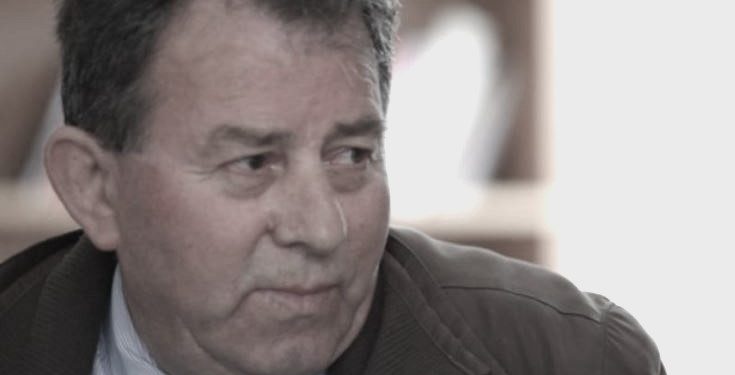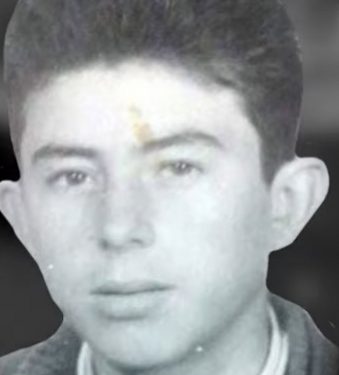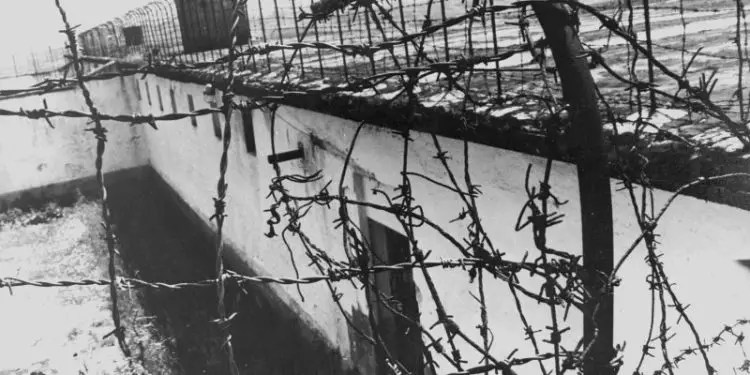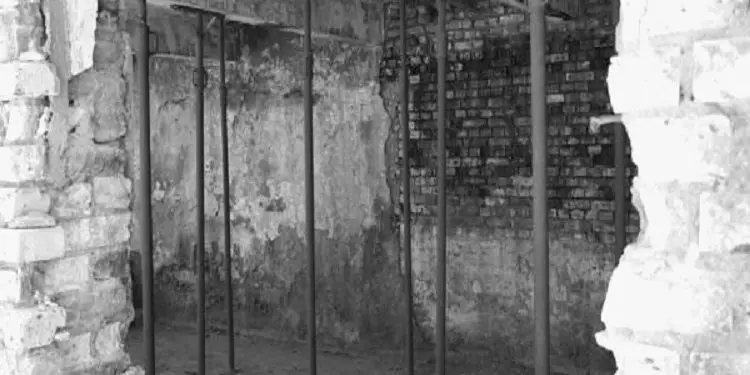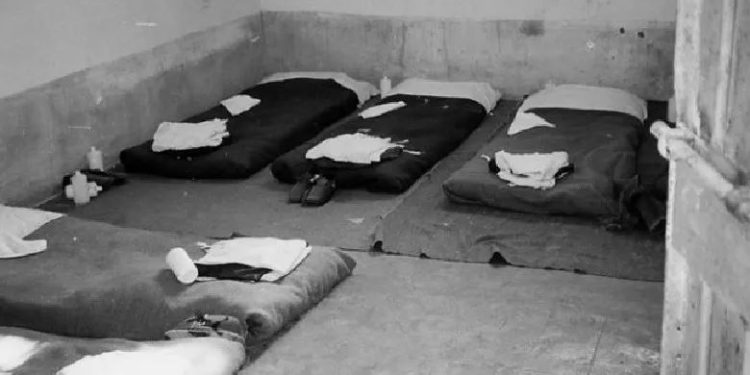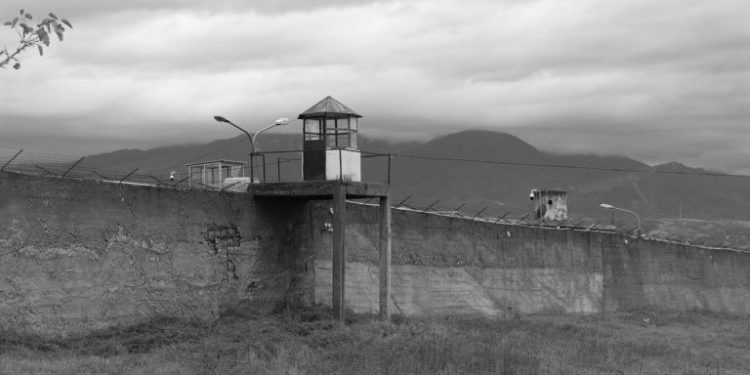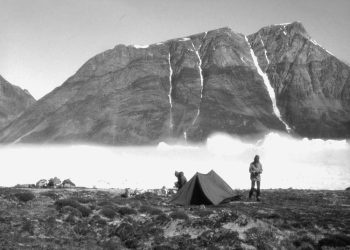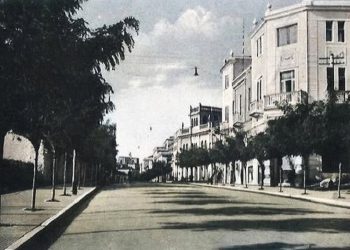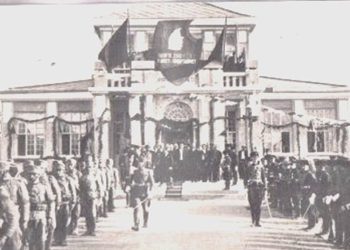By Shkëlqim Abazi
Part fifty-three
Memorie.al / I were born on 23.12.1951, in the black month, of the time of mourning, under the blackest communist regime. On September 23, 1968, the sadistic chief investigator, Llambi Gegeni, the ignorant investigator Shyqyri Çoku, and the cruel prosecutor, Thoma Tutulani, mutilated me at the Internal Affairs Branch in Shkodër, split my head, blinded one eye, deafened one ear, after breaking several ribs, half of my molar teeth, and the thumb of my left hand, on October 23, 1968, they took me to court, where the wretch Faik Minarolli gave me a ten-year political prison sentence. After cutting my sentence in half because I was still a minor, sixteen years old, on November 23, 1968, they took me to the Rrëps political camp, and from there, on September 23, 1970, to the Spaç camp, where on May 23, 1973, in the political prisoners’ revolt, four martyrs were sentenced to death and executed by firing squad: Pal Zefi, Skënder Daja, Hajri Pashaj, and Dervish Bejko.
On June 23, 2013, the Democratic Party lost the elections, a process that is perfectly normal in the democracy we claim to have. But on October 23, 2013, the General Director of the “Rilindas” (Renaissance) Government sent Order No. 2203, dated 23.10.2013, for; The dismissal of a police employee. So, Divine Providence was intertwined with the neo-communist “Rilindas” Providence, and precisely on the 23rd, I was replaced, no more and no less, by the former operative of the Burrel Prison Security. What could be more significant than that?! The former political prisoner is replaced by the former persecutor!
The Author
SHKËLQIM ABAZI
RREPSI
(Forced labor camp)
Memoir
The First Meeting
(The boat sunk in the swamp)
“And yes, they also closed the borders with Greece! And they sent them with beys and aghas, and then war and slaughter, and blood was shed up to the horse’s knee! At first, they didn’t touch us, they did take a couple of flocks, but they left me the others! I remained ‘Çelik’ (‘Steel’) alright; I had more livestock than my neighbors. But this matter didn’t last long, because some Vlachs from among our own, without property or possessions, lowlife and opportunistic types emerged and proposed that we merge our livestock. They would turn us into livestock cooperatives, but they themselves, however, didn’t have a single mangy sheep tail to hand over; in other words, they became proxies in our name. This is where my downfall began, friend!
But I still didn’t give up, because I had some powerful friends up there, which had initially stood by me. They had eaten and drunk at my sheepfolds during the War, and afterwards, whenever they wanted a lamb, they would send someone and I would give it to them. So, to make a long story short, I put on my new qylaf, my shajak and my cloak, and off to Tirana; asking here and there, I found their lair. They were generals with ranks, my boy, and they were in high positions! One for the army, Petrit Dumja, and the other for the gendarmerie, Nevzat Haznedari. You see, they were from our parts too! I had hosted and seen them off like my own sons!
So, I cooked for them and poured out my troubles. They listened to me, but advised me to hand over the flocks, because, alas, the Party was now responsible for everything and I should strive to secure pasture and provisions, not for winter, not for summer. ‘Hey, may you be safe,’ they advised me, ‘just live your old age in peace!’ ‘But what kind of disaster is this, how can I live without sheep?! Curse them, may they take my eyebrows, may they take my eyes!’ I shot back. When I realized that there was no more hope, I cursed them one more time with a ‘shame on you’ and returned to Kolonjë, to my family.
It found me like the priest in the fairy tale who dances out of trouble; ‘come on,’ I said, ‘I’ll hand over two flocks and keep one.’ That’s what I did, but my sons and grandsons were also against me; they advised me to hand over everything or sell them and leave the village. But how I could leave my homeland, I mean! I was like a stump with a hatchet stuck in it that takes root and doesn’t move anymore! I had started my life with sheep and I wanted to end it with them! If I had listened to them, maybe today I would be with my wife, but an axe handle doesn’t take kindly to a wedge, oh my dear Miço!
So, I brought trouble upon myself, my sons, and my grandsons. There are about ten Markos in prison today, supposedly dangerous enemies of the Party and the people, who supposedly wanted to overthrow the government and bring the Greeks here! And who, really?! Us, the shepherds who know neither how to read nor write, with some Greeks without trousers, of Teme Sejko’s group! Oh, Jesus Christ! What kind of nonsense is this, for heaven’s sake!? By God, if I had known any of the Cham people, I had neither seen their face nor heard their name, before they brought us here.
But the wicked ones who ate my bread and overturned my bowl, had mixed the mess well, they had tangled the ball of yarn so badly that you couldn’t find the thread. But they had calculated it well! They would confiscate my livestock without a single gold Napoleon, and they would also imprison my sons and grandsons, to build factories for free. And yes, they were also crushing the Vlachs badly; ‘If they crush ‘Steel’, who are we?!’ One market day, at the entrance to Korçë, they put handcuffs on me and took me to the prison. The wretch whom I had fed and cared for like my own son had set a trap for me.
And yes, ask the world, they beat us up! – ‘Ah, Nevzat, may God strike you, you made my dish rag filthy, you turned it to pitch!’ – I cursed him from the heart. – ‘Miço, you scratched it yourself, now keep it! Why did you get involved in politics?’ – And the stick struck. – ‘How do I know politics, you wicked man?!’ – I defended myself. – ‘You know, you know!’ – And the stick struck again. After a few months, after gathering about twenty heads of us, they took us to the judge. They gathered the whole district there, they brought everyone they could find, and they spread the word that they were supposedly punishing a dangerous hostile group, who had done all sorts of bad things together. So, my son, without doing anything at all, they took us to the courthouse, surrounded by a crowd of gendarmes and civilians, who guarded us like dogs guarding a flock.
And the prosecutor stood up, with some of his apprentices, and they didn’t leave any absurdity unsaid! One thing here and another there, they spoke haphazardly, without any connection at all. But you see, they had even put me at the head of the group! Well, they counted a hundred and one accusations against me and urged me: ‘What do you have to say?’ But what could I say? Those things that caught my ears there, in that assembly of men, had not even crossed my mind or my thoughts, let alone doing them! But since I wasn’t quite understanding what they were saying, I interrupted the prosecutor: – ‘Hey prosecutor, look now, how high you have raised the market! Slow down, come on, with this great momentum you have taken, without a bridle or stirrup, you will break your neck!’
-‘Shut up, criminal, enemy, wretch! You broke your neck, along with this scum of traitors you have with you!’ – He threatened me. – ‘Why, did you think we were blind, to deceive us? No, no, you can’t fool us! Our eagle-eyed Party, through the State Security, kept you under surveillance, monitored you constantly, and followed your every meeting and conversation with internal and external enemies!’ – ‘But where did we do all this, I mean?!’ – ‘In the mountains, when you went out with the sheep and moved from pasture to pasture, did you meet with the Greeks?’
-‘Me with the Greeks!?’ – I interrupted, surprised. – ‘You, with all these others! And yes, you also gave secret information about the location of military units, about our armed forces, our fortifications, about the warehouses of agricultural cooperatives, about…!’ – ‘Hey prosecutor, what are you babbling about like that? Gather your goats, man, they are scattered all over the strips!’ – I interrupted, astonished by what I was hearing. Then I turned my head, looked once more at those who were sitting on the bench next to me. Except for some Vlach shepherds, who only knew about sheep, and some poor wretches, who were following what was being said there with open mouths, without understanding anything at all, I didn’t distinguish anything else. Surprised by the unexpected things that were being thrown at them, they were anxiously waiting for the end.
-‘May you be struck, you and all your gendarmes!’ – I spat out at the prosecutor. – ‘But what you are accusing me of, sir, doesn’t need a guide, it can be seen with the eye from the top of Limozi, I mean!’ – ‘It can be seen, yes, it can be seen, but you gave them the secret maps, though!’ – ‘Me?’ But I don’t know a single letter, you fool? Besides the crook and the milking pen, I don’t know anything else!’ – ‘You know, you know, but you are pretending! And about those Greek diversionists and bandits, you sheltered them in your sheepfold, did you know that? And those dogs that attacked our soldiers came out of your pastures and wagged their tails at the traitors, who taught them, me? And those shepherdesses of yours, who wouldn’t say a word in Albanian to us, talked to the Greeks in Greek, who taught them, me? And those spies who occupied the paths and as soon as they saw one of us, they came to you; they warned you to hide the transceiver radio, did I teach them?! And the letters you exchanged as a courier with Asfalia (Greek Security), who made them, me?’
-‘What are you talking about? In my sheepfolds, I have hosted and seen off every person, without asking who they were. I have treated them and honored them according to their rank, just as I hosted you! And you say I taught the dogs to bark at strangers? But we feed the dogs for that reason! And you say I taught the women not to talk to strangers? But they don’t know a single word of Albanian, only the Vlach language their mother taught them and the Greek they learned in school! What do I know about transceiver radios? Besides the crook, the mess tin, the cauldrons, and the milk churns, I don’t know any other tool! How could I have seen and taken cards, when I don’t know how to read or write!? How did you pin all these lies on me, may ticks infest you?!’
‘You know, you know, but you’re pretending to deceive us?’ – ‘Ah, prosecutor, may your hair be left in this pasture, you are damning us, man?! The way you are talking, sir, we don’t know where we will end up, but come down, come down to earth and let’s talk like men!’ – ‘With you and these criminals of yours, I will only speak the language of the law! I will send all of you to the firing squad and the gallows!’ – He threatened again. – ‘What we did, I mean? But we are simple shepherds!’ – ‘What more did you want to do, you sold the interests of the Fatherland to the Greek, you collaborated with the enemies, you revealed defense locations; in a word, you committed high treason against the Party and the Albanian people!’ – ‘And who is proving all these wicked things to us?’
-‘There is a series of witnesses who confirm your crime!’ – and he called out in turn, about twenty or thirty people, shepherds and Chams and other unknowns, and yes, he also made some poor wretches stand up, who were in the same dock as us, and ordered them to repeat what he himself had said earlier. The witnesses, it seems, were singing the tune they had been taught, some boldly like roosters on a dunghill, some with stutters, like infants when they start to talk. – ‘Why, do you believe these ill-mannered people!’ – I interrupted the witnesses’ talk, completely enraged. – ‘But these people have spent their whole lives spying!’ – And I spat towards the false-witnesses. My spit and words made him foam. That’s all he needed, and he caught fire. And he brought out all sorts of nonsense. First, hitting the nail, and then hitting the horseshoe, and when it was over, they sentenced me to death. Whether I accepted it or not, they had already cut my suit.”
At this point in the narration, the old man fell silent. He knocked the pipe on the wooden stair and, after filling it again, lit it with the shell casing lighter, puffed and exhaled several times, then continued:
-“But it was not meant for them to kill me, my boy, otherwise this matter would have ended! After all, I would have been saved once and for all, along with those who are toiling after me! They commuted my sentence to twenty-five years, I have served eight, and I have seventeen more! But whether the donkey or the owner, God knows the end! So, my son, I told you this so you know, because you are going to school and you will speak someday! Maybe you will be destined to come out alive, because you are still young; unlike the rest of us!” – He puffed on the pipe exhaled the smoke that swirled around his gray head, and he sighed:
-“Ehu-uu, here, in this thorn bush, we are going to leave our hair!” – Then he fell silent, hidden behind the dense cloud of smoke. Throughout the time he was talking, he was filling the pipe, puffing on it with gusto, and when he finished, he would hit it and knock it on the wooden stair and fill it again and again. I couldn’t count how many times he filled and emptied it, but lost in thought, I watched the swirling smoke that intertwined with his gray hair, outlining a halo-like circle around his head.
-“Uncle Miço, I feel sorry for the disaster that has befallen you!” – I rushed to console him. – “What can we do, my boy, one must yield to the wood, one must smash the stone, one must endure the hardship! This must have been our fate! God willing, maybe in the next world, there will be peace for us too!” – The old man concluded and knocked the pipe immediately. Uncle Miço was special; a very intelligent old man, so to speak, a kind of Siamese twin of Uncle Esheref, only they differed in dialect, one used the varied Dibra dialect, the other expressed the figurative perfection of the famous Frashëri family.
Just to hear these jewels of popular wisdom, it was worth provoking Uncle Miço. Rarely have I had the chance in life to meet people with such eloquent expressions. I truly felt favored by fate; chance had thrown me from the northern popular school into the southern school. This is how I spent my time in this barrack, where I resided for almost four months, until one autumn day, they sent me as a ‘tourist’ for more advanced training, to the Burrel prison. During the period I lived in the ‘Wrecks’ barrack near this intelligent old man, I benefited a lot; firstly, I was given the chance to enrich my vocabulary with the most typical expressions of the Korçë-Kolonjë-Leskovik-Përmet area. But through my friendship with the old man, I also had a second benefit; I attracted the goodwill of the group of shepherds, whose undeclared leader was considered Uncle Miço.
After settling there, even the wretched brigadier, the cynic Nasho Gërxho, as well as some negative Vlachs, did not provoke me as before. Perhaps the influence of ‘Steel’ was undisputed even in prison, where they lacked sheep! They lowered their tone and then stopped their attacks on me altogether. I can say without exaggeration that a peaceful environment was created for me, given the prison conditions, and even a part of them helped me in the smooth running of my studies. But in the ‘Wrecks’ residence, I also found a common language with the other neighbors, I developed affinity and a good and quite correct relationship. Thanks to their understanding and my good manners, I would enjoy the support of almost all the clerics, regardless of the religions they represented.
Later, when they would move me from Reps, whether to Burrel or Spaç, I would enjoy the fruits of this support. Especially, I felt the peak of the benefit after the nineties, when Uncle Miço and many other old men were no longer alive, but religion was legitimized, their names were rehabilitated, and their ideals were being implemented. But perhaps, this will be the subject of a separate topic, in a chapter of its own.
The First Death (Oh God! They would break you on crosses there, with an iron lever!)
Where life does not take root, existence is extinguished! Unlike all natural environments where living beings breathe, in prisons and camps, life did not take root, but only death. It accompanied you twenty-four hours non-stop, for weeks, months, years, decades. It almost clung to your back and wouldn’t leave you, until a moment came and you got used to that burden, like the weight of an old coat; you no longer felt fear or terror, on the contrary, you wished for it, you invited it to snatch you away as soon as possible to its kingdom, as a way of salvation from the troubles of this world.
But even when it heard you, it did not come by itself as a consequence of natural causes, like the expected end for every living creature, but it was stimulated, pushed, caused. Although the State Security masters tried to minimize the number, deaths still occurred in large numbers, as were the causes that caused them. Despite the manipulation of documents, to conceal the real reasons for the loss of life, which presented the cases as normal phenomena, they did not always succeed in hiding the reality. They remained debatable in their particularity, forms, and consequences. The news from the “Kingdom of Hades” did not often manage to penetrate the gate guarded by “Cerberus,” yet they secretly managed to penetrate the walls of muteness and the regime’s deafness, crossed the barbed wire fences and spread far and wide.
In the minutes, the masters listed the reasons and then, depending on the case, divided them into: natural death, accidental, suicide, etc. In the first category, they classified: deaths due to old age, which happened when an individual, tired of the long road, broken and crushed by diseases acquired over the years, faded away slowly, like a lamp whose oil runs out. But here they also grouped incurable diseases, such as myocardial infarctions, advanced cancers, etc., which the command claimed to have done everything possible to save the unfortunate, but even under hospital care, the poor wretch had not found a remedy.
In such cases, the fellow sufferers who knew the true causes better than anyone felt the loss more deeply, and with difficulty found words to comfort the relatives and friends, if there were any in prison, or even the family members outside, if they found the opportunity. With that, the ledger was closed for the unfortunate; his story entered the annals of oblivion, he was buried somewhere in the remote corners and stuck in the memory of his fellow sufferers, like all the others who, for the same reasons, were extinguished in the vise of the dictatorship. The issue became somewhat complicated when it came to separating natural deaths from the special ones, because within this grouping, they often hid cases of fatalities due to lack of medical treatment, or careless treatment.
It had happened that even from a banal poisoning, from appendicitis, or an intestinal obstruction, the unfortunate person would go into a state of shock, and even if they took him to the clinic, he would have ended up as a corpse in time. But it had happened in many cases, when a person who needed help was not offered any at all, or even worse, they were given expired or different medications than those needed for the disease he was suffering from, and consequently, instead of bringing him back cured, they sent him to the morgue! These cases were not reflected anywhere. Accidental deaths at work were also included in this grouping.
Almost all accidents occurred due to lack of working conditions, although they screamed about technical safety rules, which they never fulfilled. In the papers, every detail was neatly arranged, while on the ground the opposite was true, every means for life safety was missing. Add to this the psychological and physical violence that the camp authorities exerted on the convicts, to forcibly compel them to work even where there was no guarantee; this constituted an added reason for the increase in the number of accidents. With various forms of pressure, under the anxiety of the unknown that awaited you if you failed to meet the norm, many unfortunate people left their bones under the massifs of stones and tons of earth, especially in the holes of Spaç.
Also here were listed the violent deaths, which, although the cause was often camouflaged, the primary means always remained violence. This could be both physical and psychological. This interweaving of violence was applied especially during the investigation processes, where the arrested were required to confess to uncommitted crimes, words never spoken, or to testify about individuals, often even unknown ones, to enlarge the groups, to expand the circle of co-conspirators in crime, to then make media scoops with public trials.
To extort the confession, the beating would begin. After beating him brutally, to the point of unconsciousness, in the end they remembered to check if the unfortunate person was still breathing, but when they realized that he had died in their hands and they had added another victim, they would draw up a report, claiming that he had suffered a cardiac arrest. With this, they justified the crime, but more so they performed the ritual and closed the matter, to continue thus, with others and others. This method was also often practiced in camps. But in such cases, not to get confessions, but simply to bring down some “rock head,” who “dared” to resist them and could become a cause to inject his stubbornness into others as well.
Then the punitive squad, which was filled with some heartless sadists, would enter the dance. They would snatch the defiant one like a hawk snatches a pigeon, strip him naked and thus naked, lay him on a wooden bench, where, after tying him firmly with ropes, they would start beating him. They deliberately left the doors and windows open, so that the screams of the poor wretch would spread far and wide across the camp space. The screams would go down the valley of Fan and up the slopes of Orosh, until they faded away. Thus, the defiant one was given an exemplary lesson, and terror was instilled in the tissues of the others. However, it happened that the punished one turned out to be one of those “crazy ones,” who were not few in prisons, who would respond to the increased violence with maximum reaction, and the dance of the beating would last and last, to the extreme. When he fell unconscious, the punishers would stop the rush, but by then it was too late… the unfortunate one had ended up as a corpse!
Then they would quickly concoct some diagnosis or another, with the sole condition that it be included in the group of incurable diseases, to close the report. But worse things happened too; someone they had targeted for elimination, for a host of reasons that all nevertheless converged with politics; they would concoct extremely crude horror scenes, where the victim was met with the same end, death! But this time with dignity faded away. The targeted person was brutally eliminated by his own fellow sufferer. This diabolical method, which they perfected to perfection, left behind an endless sequence of vengeance.
It was among the most preferred forms of the Security. Thus, the meat was cooked, and the spit was not burned; in other words, the political opponent disappeared, and the hostility remained open, like the ever-hungry maw of a hydra for blood. Deaths on the barbed wire fences of the enclosure, from the guards’ rifles, were another violent way. Now, this outdated method was practiced from time to time against unsub missive persons, whom they considered quite dangerous, not only for the free society, but also for the local environment.
They would send the unfortunate person to work, specifically near the barbed wire fences, and there the soldier, without giving any signal, would shoot at the victim. They shot with cannibalistic pleasure at every convict, without the slightest remorse, rejoicing over the decorations, commendation letters, and the fifteen-day leave, which the command applied as a stimulus. Memorie.al




